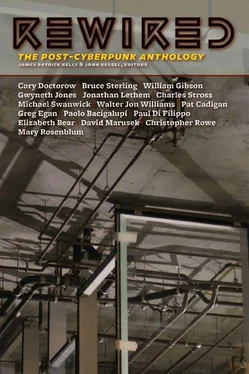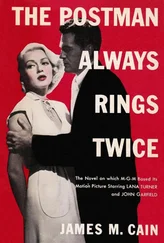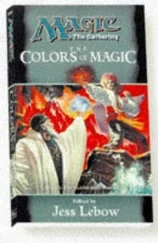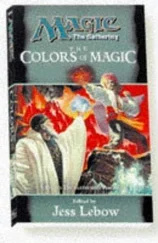“Soma-With-The-Paintbox-In-Printer’s-Alley,” said voices from above. Soma turned to watch the policemen land. They all spoke simultaneously in the singsong chant of law enforcement. “Your car will be healed at taxpayers’ expense.” Then the ritual words, “And the wicked will be brought to justice.”
Efficiency and order took over the afternoon as the threatened rain began to fall. One of the 144 Detectives manifested, Soma and the policemen all looking about as they felt the weight of the Governor’s servant inside their heads. It brushed aside the thoughts of one of the Highway Patrolmen and rode him, the man’s movements becoming slightly less fluid as he was mounted and steered. The Detective filmed Soma’s statement.
“I came to sketch the children in the surf,” said Soma. He opened his daypack for the soapbubble lens, laid out the charcoal and pencils, the sketchbook of boughten paper bound between the rusting metal plates he’d scavenged along the middenmouth of the Cumberland River.
“Show us, show us,” sang the Detective.
Soma flipped through the sketches. In black and gray, he’d drawn the floating lures that crowded the shallows this time of year. Tiny, naked babies most of them, but also some little girls in one-piece bathing suits and even one fat prepubescent boy clinging desperately to a deflating beach ball and turning horrified, pleading eyes on the viewer.
“Tssk, tssk,” sang the Detective, percussive. “Draw filaments on those babies, Soma Painter. Show the lines at their heels.”
Soma was tempted to show the Detective the artistic licenses tattooed around his wrists in delicate salmon inks, to remind the intelligence which authorities had purview over which aspects of civic life, but bit his tongue, fearful of a For-the-Safety-of-the-Public proscription. As if there were a living soul in all of Tenne ssee who didn’t know that the children who splashed in the surf were nothing but extremities, nothing but lures growing from the snouts of alligators crouching on the sandy bottoms.
The Detective summarized. “You were here at your work, you parked legally, you paid the appropriate fee to the meter, you saw nothing, you informed the authorities in a timely fashion. Soma-With-The-Paintbox-In-Printer’s-Alley, the Tennessee Highway Patrol applauds your citizenship.”
The policemen had spread around the parking lot, casting cluenets and staring back through time. But they all heard their cue, stopped what they were doing, and broke into a raucous cheer for Soma. He accepted their adulation graciously.
Then the Detective popped the soapbubble camera and plucked the film from the air before it could fall. It rolled up the film, chewed it up thoughtfully, then dismounted the policeman, who shuddered and fell against Soma. So Soma did not at first hear what the others had begun to chant, didn’t decipher it until he saw what they were encircling. Something was caught on the wispy thorns of a nodding thistle growing at the edge of the lot.
“Crow’s feather,” the policemen chanted. “Crow’s feather Crow’s feather Crow’s feather.”
And even Soma, licensed for art instead of justice, knew what the fluttering bit of black signified. His car had been assaulted by Kentuckians.
Soma had never, so far as he recalled, painted a self-portrait. But his disposition was melancholy, so he might have taken a few visual notes of his trudge back to Nashville if he’d thought he could have shielded the paper from the rain.
Soma Between the Sea and the City , he could call a painting like that. Or, if he’d decided to choose that one clear moment when the sun had shown through the towering slate clouds, Soma Between Storms .
Either image would have shown a tall young man in a broad-brimmed hat, black pants cut off at the calf, yellow jersey unsealed to show a thin chest. A young man, sure, but not a young man used to long walks. No helping that; his car would stay in the trailhead lot for at least three days.
The mechanic had arrived as the policemen were leaving, galloping up the gravel road on a white mare marked with red crosses. She’d swung from the saddle and made sympathetic clucking noises at the car even before she greeted Soma, endearing herself to auto and owner simultaneously.
Scratching the car at the base of its aerial, sussing out the very spot the car best liked attention, she’d introduced herself. “I am Jenny-With-Grease-Beneath-Her-Fingernails,” she’d said, but didn’t seem to be worried about it because she ran her free hand through unfashionably short cropped blond hair as she spoke.
She’d whistled for her horse and began unpacking the saddlebags. “I have to build a larger garage than normal for your car, Soma Painter, for it must house me and my horse during the convalescence. But don’t worry, my licenses are in good order. I’m bonded by the city and the state. This is all at taxpayers’ expense.”
Which was a very great relief to Soma, poor as he was. With friends even poorer, none of them with cars, and so no one to hail out of the Alley to his rescue, and now this long, wet trudge back to the city.
Soma and his friends did not live uncomfortable lives, of course. They had dry spaces to sleep above their studios, warm or cool in response to the season and even clean if that was the proclivity of the individual artist, as was the case with Soma. A clean, warm or cool, dry space to sleep. A good space to work and a more than ample opportunity to sell his paintings and drawings, the Alley being one of the other things the provincials did when they visited Nashville. Before they went to the great vaulted Opera House or after.
All that and even a car, sure, freedom of the road. Even if it wasn’t so free because the car was not really his, gift of his family, product of their ranch. Both of them, car and artist, product of that ranching life Soma did his best to forget.
If he’d been a little closer in time to that ranching youth, his legs might not have ached so. He might not have been quite so miserable to be lurching down the gravel road toward the city, might have been sharp-eyed enough to still see a city so lost in the fog, maybe sharp-eared enough to have heard the low hoots and caws that his assailants used to organize themselves before they sprang from all around him — down from tree branches, up from ditches, out from the undergrowth.
And there was a Crow raiding party, the sight stunning Soma motionless. “This only happens on television,” he said.
The caves and hills these Kentuckians haunted unopposed were a hundred miles and more north and east, across the shifting skirmish line of a border. Kentuckians couldn’t be here, so far from the frontier stockades at Fort Clarksville and Barren Green.
But here they definitely were, hopping and calling, scratching the gravel with their clawed boots, blinking away the rain when it trickled down behind their masks and into their eyes.
A Crow clicked his tongue twice and suddenly Soma was the center of much activity. Muddy hands forced his mouth open and a paste that first stung then numbed was swabbed around his mouth and nose. His wrists were bound before him with rough hemp twine. Even frightened as he was, Soma couldn’t contain his astonishment. “Smoke rope!” he said.
The squad leader grimaced, shook his head in disgust and disbelief. “Rope and cigarettes come from two completely different varieties of plants,” he said, his accent barely decipherable. “Vols are so fucking stupid.”
Then Soma was struggling through the undergrowth himself, alternately dragged and pushed and even half-carried by a succession of Crow Brothers. The boys were running hard, and if he was a burden to them, then their normal speed must have been terrifying. Someone finally called a halt, and Soma collapsed.
Читать дальше












